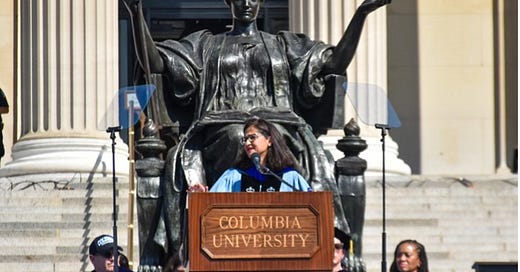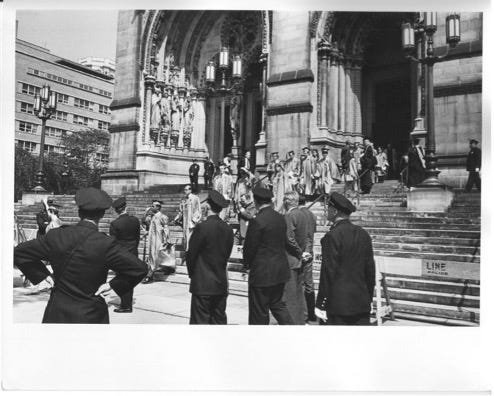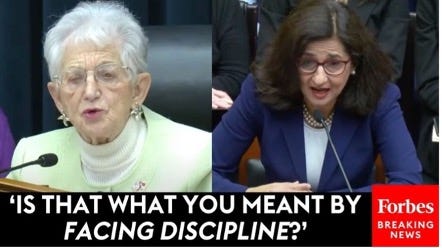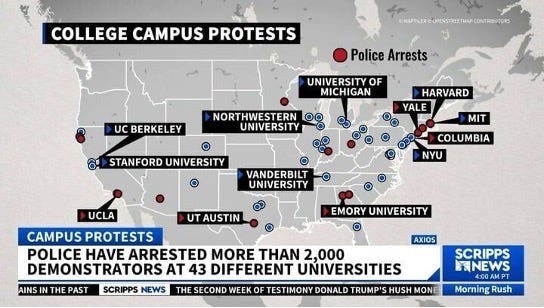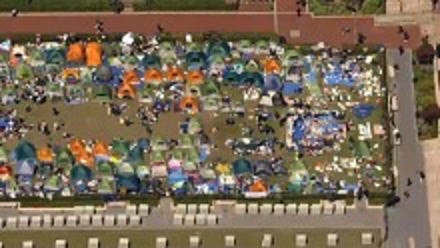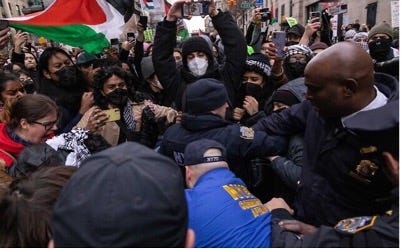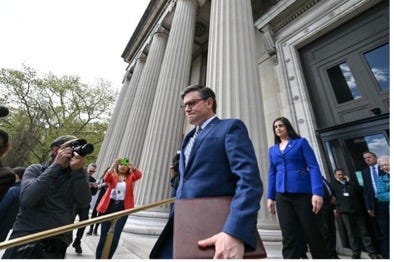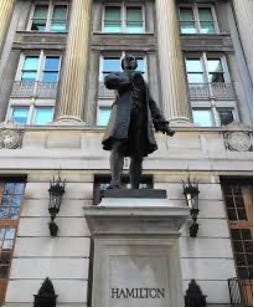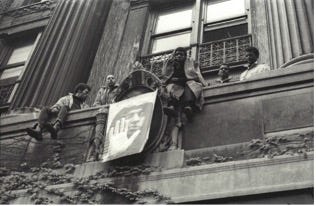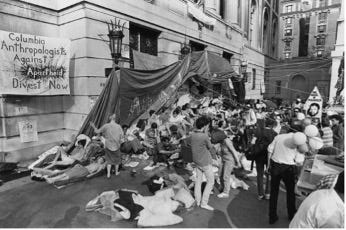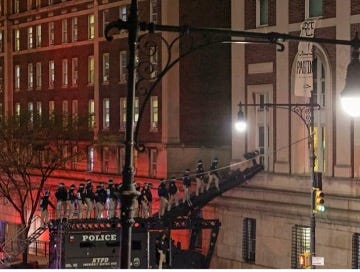May 15th 2024
Dear Minouche,
I can only imagine how difficult this day has been for you.
A year ago, at the 2023 University Commencement, as incoming Columbia President, you gazed out across Low Plaza, McKim, Meade, and White’s sublime Beaux-Arts public space. All those thousands of commencers, a sea of slate-blue regalia.
Typically, at the end of the school year, the heart of Columbia’s Morningside Heights campus becomes a sweeping venue with bleacher seating and thousands of graduates arrayed around the steps of Low Library. The university president takes center stage, officially conferring the degrees on the graduates from the school’s different colleges.
Dr. Nemat Shafik – yourself the recipient of an Honorary Columbia Doctor of Laws, conferred by outgoing President Lee Bollinger – you must have envisioned the 2024 ceremony with yourself, as Columbia’s 20thPresident, framed by the massive ionic columns of Low, and by the open arms of Alma Mater, conferring thousands of AB, JD, MA, MD, PhDs, and introducing to the enormous crowd this year’s honorary degree recipients.
But no. That was not to be. No Low Plaza. No sea of blue, no conferring of anything.
You cancelled he 2024 University Commencement.
The divisions of the University celebrated (sic) their class days separately in 18 mini-commencements. You called it a change of format. You called it for students, by students.
Canceling the traditional Commencement ceremony was one of the toughest calls in a year of many tough calls. I recognize the toll the past few months have taken on your university experience, and I want you to know that I am deeply sorry for the disappointment that many of you may be feeling as a result. I also know that Class Days and other celebrations have gone well and that the pride and joy of Commencement has shone through despite the change of format.
Columbia College held its Class Day not, as is traditional, in front of Hamilton Hall, but five miles north at the Baker Athletic Complex, home of the formidable Columbia Lions football team.
It was held at the school’s athletic complex far north of Columbia’s Morningside campus. Embattled president Minouche Shafik did not appear at this or other Class Day ceremonies in recent days. -- Washington Post.
Where were you?
Nowhere to be found.
From the Cathedral to the Stadium
There is, of course, a precedent for the reformatting of Commencement.
In 1968, after occupation of five classroom buildings and ensuing police bust, Grayson Kirk’s administration found sanctuary for the official commencement a few blocks south of Low Plaza in the splendid Gothic Revival nave of the nearby Cathedral of St. John the Divine. The eminent Columbia historian Richard Hofstadter gave the address.
On the main plaza, protesters staged a counter-commencement with Dwight MacDonald as the speaker. Many of the Cathedral attendees disrespectfully walked out in the middle of the official ceremony and headed over to the Plaza -- across which, on April 30th, the NYPD had dragged 700 protesters to police vans during the violent defenestration of the occupation.
Because of a student-faculty strike, the final weeks of the 1968 academic year saw many classes conducted away from the campus. Professor Frederick Dupee wrote in his memoir of the rebellion:
The following Friday (May 3) I met my Shakespeare students for the first time in ten days. About half of the class (forty) was present. Several wore bandages, one was on crutches, one had his arm in a sling, and the teacher had a black eye. A well-organized student strike was strongly in force. There was great resentment of the police and still more resentment of an Administration which had been unable to solve the University’s problems without resorting to force.
This year’s undergraduates also attended classes remotely. But this time, the order came from the top.
The decibel of our disagreements has only increased in recent days. These tensions have been exploited and amplified by individuals who are not affiliated with Columbia who have come to campus to pursue their own agendas. We need a reset.
To deescalate the rancor and give us all a chance to consider next steps, I am announcing that all classes will be held virtually on Monday. Faculty and staff who can work remotely should do so; essential personnel should report to work according to university policy. Our preference is that students who do not live on campus will not come to campus.
After the police evacuated Hamilton/Hind’s Hall, you promised reconciliation: the kumbaya to happen on May 15th at the upcoming commencement. In a message to the community on May 1st you wrote:
It is going to take time to heal, but I know we can do that together. I hope that we can use the weeks ahead to restore calm, allow students to complete their academic work, and honor their achievements at Commencement.
A few days later, on May 5, you cancelled the whole thing.
"Holding a large commencement ceremony on our campus presented security concerns that unfortunately proved insurmountable," said Columbia spokesperson Ben Chang. "Like our students, we are deeply disappointed with this outcome." Graduation had been scheduled for May 15.
Minouche, it’s difficult to understand how you could not have provided security to an event on the main quadrangle. Unlike in 1968, wrought iron gates seal off every entrance to the Morningside campus. College Walk is no longer the unimpeded thoroughfare it was back then. Right now, and for previous weeks, there are armed police at those gates. Entrance is severely restricted.
Why couldn’t you have allowed admission to legitimate stakeholders -- faculty, graduates, parents, guests -- though checkpoints? It’s a simple matter of ticketing – done all the time at baseball stadiums. In fact, tickets are required at the uptown class days.
Or why couldn’t you have held the ceremonies at the Cathedral with overflow at Riverside Church the way Grayson Kirk did?
Instead, you fragmented an already fragmented community on the most important day of the academic year.
Had you held a university-wide commencement, would there have been unpleasantness? Highly likely! But no threats to safety.
More likely, vigorous condemnation – shouts, boos, Palestinian and Israeli flags – students and faculty walking out. In other words, it would have been an embarrassment to you and a rebuke of all you’ve done since October 7th.
Suspension without representation.
After the Hamas attacks, you responded vigorously to so-called antisemitism. On November 10th2023, the administration banned the two foremost pro-Palestinian groups, Students for Justice in Palestine (SJP) and Jewish Voice for Peace (JVP). On October 26th those groups had staged a walkout on the main campus. Already they were calling what was happening in Gaza genocide.
Suspension means the two groups will not be eligible to hold events on campus or receive University funding. Lifting the suspension will be contingent on the two groups demonstrating a commitment to compliance with University policies and engaging in consultations at a group leadership level with University officials.
Turns out that the policies to which the two organizations were to have been non-compliant were written in secret – only a couple of days before they were selectively enforced.
Not only were anti-Zionist students suspended, they were doxed. A truck displaying their photos drove round and round outside the campus. You ignored the hurt and possible danger this vehicle, commissioned by the notorious right-wing organization, Accuracy in Media inflicted on Columbia students in your care.
The doxing truck had a chilling effect on campus protests. Fewer students showed up to the rallies, members of SJP told me. Those who did often hid their faces, fearing that a classmate would send their information to Accuracy in Media or that the doxing truck would park outside their parents’ homes, as it did those of a number of Harvard students.
The Task Force
In the middle of all this unrest, you mandated an antisemitism task force. charged with understanding how antisemitism manifests itself on campus.
This is an opportunity for every academic department, every faculty member and teaching assistant, every member of the administration, and every member of the Columbia, Barnard, and Teachers College student family to bring their ideas, life experiences, and spirit to help us emerge as a stronger and more cohesive community.
However:
For the task force, the university chose three Jewish professors as co-chairs because they are seasoned senior faculty who know how Columbia works. They are not academic experts in antisemitism research, however.
As might have been predicted, the Task Force waded into the mire of attempting to come up with a definition of its own eponym. Their boots sunk deeper and deeper as they tried to choose.
Do we go with the International Holocaust Remembrance Alliance (IHRA) working definition or Jerusalem Declaration?
Competing factions on campus and beyond are pushing for two different definitions. The first, favored by the U.S. State Department and many supporters of Israel, says “targeting of the state of Israel” could be antisemitic, a definition that could label much of the pro-Palestinian activism sweeping campus as antisemitic.
The second is narrower. It distinguishes between anti-Zionism and antisemitism and could lead to criticism that the school is not taking antisemitism seriously enough.
The former conflates antisemitism with anti-Zionism. Criticism of the existence of the State of Israel is off limits. So, a chant like Death to the Zionist state would constitute harassment of Jewish students. Certainly, any condemnation of IDF slaughter in Gaza or comparison to Nazi atrocities like the destruction of the Warsaw Ghetto, would be punishable.
The latter makes a distinction between anti-Zionism and antisemitism. Among the forms of criticism that it considers NOT to be antisemitic:
Evidence-based criticism of Israel as a state. This includes its institutions and founding principles. It also includes its policies and practices, domestic and abroad, such as the conduct of Israel in the West Bank and Gaza, the role Israel plays in the region, or any other way in which, as a state, it influences events in the world. It is not antisemitic to point out systematic racial discrimination. In general, the same norms of debate that apply to other states and to other conflicts over national self-determination apply in the case of Israel and Palestine. Thus, even if contentious, it is not antisemitic, in and of itself, to compare Israel with other historical cases, including settler-colonialism or apartheid.
So, as you might expect, this Task Force, like so many committees in academia, devolved into furious discord and threw up its hands.
The professors argue that their 15-member task force does not need to define antisemitism, because they don’t see it as their task to label things as antisemitic or not. Rather, they want to hear why Jewish students and faculty are upset and see if there are practical solutions that can be found to help them feel more comfortable.
Then, on March 24th, an event called Palestinian Resistance 101, sponsored by was held in one of the residence halls. Some of the speakers crossed a line into what you called an abhorrent breach of our values.
During the “Resistance 101” event, speakers repeatedly backed Palestinian “resistance,” which in their view included open support for Hamas. One of the speakers, Khaled Barakat, a Palestinian writer and activist, referred to his “friends and brothers in Hamas, Islamic Jihad, the PFLP.” – Jewish Telegraphic Agency
In response, four students were immediately suspended from classes, and given 24 hours to vacate their Columbia housing. In addition, the university notified law enforcement and contacted an outside investigation firm.
The administration’s actions come against the backdrop of government investigations of antisemitism at Columbia. The House Committee on Education and the Workforce, which has been investigating antisemitism on a number of campuses, said on X, above a clip from last month’s event, that “a taxpayer-supported institution’s members providing a forum to promote terrorism raises serious questions.”
FOXX AND FRIENDS
On April 17th, you came before the House Committee on Education & Workforce, chaired by Virginia Foxx (R-NC) and featuring masters of hectoring, innuendo, and the fear of the Lord.
COLUMBIA IN CRISIS: COLUMBIA UNIVERSITY'S RESPONSE TO ANTISEMITISM
An appearance by a female Ivy president before this disingenuous committee could prove fatal. Ask Claudine Gay or Liz Magill. Ms. Foxx and her merry band’s political raison d’etre was not to defend Jewish students but to score gotcha moments on woke, elite Ivy League universities.
The Republicans controlling the committee have no real interest in protecting anyone from rabid antisemites. After all, as Donald Trump said after Charlottesville, There were good people on both sides.Dinner with Nick Fuentes, anyone?
The aim of this committee was, and is, to fan the flames of moral panic on the right. Like anti-communism back in the day, the antisemitism label allows free-range fear mongering against the woke, the urban elites, DEI, and a plethora of Trumpian ideological shibboleths.
Rather than stand up to the hypocritical hectoring, you chose to perform the necessary -- grovel, kowtow, repent, throw faculty under the bus -- anything to survive.
Tenured Professor Joseph Massad proved an easy target, both for Elise Stefanik and for you.
Stefanik corrected Shafik, saying that Massad is still listed as the chair of the academic review committee on its website. Shafik responded that she would need to “check that,” to which Stefanik asked if she had Shafik’s “commitment that he would be removed today.” . . . Stefanik then revisited Shafik’s remarks on Massad, asking if she could clarify whether Massad was still the chair of the Faculty of Arts and Sciences academic review committee. Shafik confirmed that he was under investigation but declined to say whether Massad was still the chair. Stefanik continued to press Shafik on whether she would commit to removing Massad as chair.After a pause, Shafik said, “I think that would be—yes. Let me come back with yes.”
By the end of your testimony, Minouche, defenders of academic freedom knew there would be no staunch defense coming from you or the three others you brought along – no At long last have you no sense of decency? moment.
However, you did rescue Alma Mater from the certainty of being smitten by the angry God of Genesis 12:3
While you were pitching shifty explanations to the Fox Committee, pro-Palestinian activists were stealthily pitching tents on Eastern South Lawn. The brilliant undergraduate journalists from Columbia Spectator were on the scene.
Columbia’s policies forbid political demonstrations. Students gathered at various points around campus with their gear, trying not to arouse suspicion, and waited until it was time to move to the South Lawn in groups they called platoons. The campus gates at West 116th Street on Broadway and Amsterdam Avenue were wide open.
The Gaza Solidarity Encampment was organized by a group called Columbia Apartheid Divest or CUAD.
Immediately, extreme polarization set in. Some Jewish students were inside the tents with the demonstrators, other Jewish students felt threatened.
I was walking from my dorm to go to Chabad, a space for Jewish students at Columbia, and someone yells, “You fucking Jew, you keep on testifying, you fucking Jew.” I had clearly not been in Washington, D.C., that day testifying. I was not involved in anything political. I was simply a Jewish student wearing my yarmulke.
Minouche -- before you could say clear and present danger, which is what you did say, the NYPD entered the campus for the first time since 1968 and removed the demonstrators. 34 hours after the tents had gone up, the lawn had been cleared.
What you unknowingly triggered with that police bust was profound and transformative. All over the country, similar encampments, similar Palestinian solidarity demonstrations, sprang up. On the campuses of Yale, CCNY, Indiana – well over a hundred universities – tents were erected and red/green/black flags were flown as students and faculty took up the cause of Gaza shouting for the war to cease.
Roar Lion Roar!
You also immediately drew the ire of Columbia faculty. By ignoring the established procedure for permitting police access to the campus, established after the 1968 chaos, you violated the very governance you were mandated to uphold.
“The attack on students today violates fundamentally a core component of academic life, namely shared governance,” Pollock said. “The president consulted in the most cynical way with the University Senate; did not achieve consensus on the deployment of NYPD on Columbia campus. This has not happened since 1968. And in the last 50 years, Columbia has been extremely careful about these extreme measures, and that care was violated today.”
After the clearance, not even the NYPD Chief of Patrol backed up your claims of threats to safety.
He noted that the NYPD had zero reports of violence or injuries—except, perhaps, bruising to Shafik's ego—associated with the encampment. "To put this in perspective, the students that were arrested were peaceful, offered no resistance whatsoever, and were saying what they wanted to say in a peaceful manner,"
Without so much as a by your leave, before you could say Free Free Free Palestine, a second encampment sprung up, this time on the Western South Lawn.
It needs to be pointed out here that these on-campus encampments were, orderly, peaceful, and non-violent. The tone of the protests on the streets outside the campus was far less temperate.
Much of what the public saw on the legacy media was not coming from South Lawn because the media were not allowed through the wrought-iron gates.
Perhaps, Madam President, Had you left your office in Low, walked down the steps to the encampment and discussed matters with the occupants, you would have seen them as human beings, not delinquent trespassers.
Soon Columbia’s campus was invaded by outside agitators. Not Hamas snipers, but those same United States Congresspersons that had taken aim at you a week before. Mike Johnson and the ragtag Republican travelling circus, showed up uninvited on the Low steps and called, once more, for your resignation.
If at first you don’t succeed . . .
HAMILTON HALL
Alexander Hamilton is Columbia’s most notable alumnus. What other Ivy League college can boast a founding father whose countenance is on the five-dollar bill and whose life is the subject of a hit Broadway musical?
There is a story about the undergraduate Hamilton, possibly apocryphal, that is passed down to every Columbia freshman during orientation. Diogenes first heard it from History Professor James Shenton.
It concerns the second president of King’s College, the Reverend Doctor Myles Cooper.
By all accounts, Cooper was a brilliant educator. George Washington sent his stepson to New York to be under his care. Cooper founded the College of Physicians and Surgeons, the first medical school in the colonies and changed the emphasis of the College curriculum from the sciences to the humanities. That certainly had its effect. Some of his students went on to shape the United States of America – John Jay, Robert Livingston, Gouverneur Morris, Alexander Hamilton.
Hamilton was particularly fond of Cooper, but he was a student radical – a member of the Sons of Liberty, progenitor of the many revolutionary factions to come. This from CUwiki:
Events of May 10, 1775
On the evening of May 10, 1775, a "murderous band" of patriots, incensed by Cooper's latest, scathing denouncements in the press, marched with torches, pitchforks, and dogs to the King's College gates, with the express intent of tarring and feathering Myles Cooper.
A student, widely believed to be Alexander Hamilton, stood at the gates, facing the crowd. There, he began to harangue them on the inadvisability of resorting to violence before all alternatives could be explored. The crowd pressed up against Hamilton, but were briefly calmed. Meanwhile, a close friend snuck inside the College to warn Cooper.
Cooper happened to be sleeping, and upon being awakened, leaned his head out the window and saw the mob. Cooper was also somewhat deaf, so upon seeing Hamilton gesticulating wildly at the crowd, but not realising that he was exhorting the crowd to be calm and not resort to violence, shouted "He's crazy! Don't listen to him!" before being pulled back inside.
Cooper then made a quick dash out a back door and ran down to the docks in his nightgown. He sulked around the docks all night, trying to avoid detection. In the morning, he was picked up by the HMS Kingfisher, and taken back to Britain, never to return.
The present Hamilton Hall has been the epicenter of many student occupations and blockages. During each one, it has been renamed.
In 1968, it was christened Malcolm X Liberation College by black students who usurped the white students’ occupation, sending them off to occupy Low Library and the subsequent three buildings.
In 1985, it became Mandala Hall. The building was blocked for over three weeks in a strike demanding the University divest its South Africa holdings. The trustees yielded and that success led to other universities doing the same.
In 2024, the occupiers unfolded a large banner designating it Hind’s Hall in memory of Hind Rajab, a six year old Palestinian girl murdered by the Israeli Defense Force.
Your 2024 reaction to the occupation of Hamilton/Hind’s was swift and decisive. No shilly-shallying like Grayson Kirk in ’68.
The events on campus last night have left us no choice. With the support of the University’s Trustees, I have determined that the building occupation, the encampments, and related disruptions pose a clear and present danger to persons, property, and the substantial functioning of the University and require the use of emergency authority to protect persons and property.
At your request and with the greenlighting of New York City Mayor Eric Adams, The Bear, a military style vehicle with level 4 ballistic protection (in case the occupiers were armed with bazookas), lumbered up Amsterdam Avenue and stuck its ramp into the second floor of Hind’s – allowing dozens of armed police in full riot gear to enter the building.
At Shafik’s request, hundreds of police stormed campus. One group of officers surrounded and entered the second encampment, searching tents for protesters. Another line of officers used a mechanized ladder to enter Hamilton Hall via a second-floor window facing Amsterdam Avenue, while others flooded toward the building’s main entrance. Protesters linked arms in front of Hamilton as police approached with raised riot shields. As the human barricade gave way to arrests, protesters reported numerous incidents of police brutality. In six minutes, cops used power tools to breach a barrier made of bike locks and metal picnic tables before entering with guns drawn. One shot into an office, apparently by accident.
This NYPD propaganda video must be seen to be believed. You’d think Osama Bin Laden was hiding in the College Dean of Admission’s office.
The question Diogenes must ask, Minouche, is why? Why didn’t you order Hamilton, Low, and other classroom buildings securely guarded before the agitators smashed that little window and let themselves in? I mean anyone even remotely cognizant of Columbia’s history of protest would have known that breach and occupation was a possibility, even a likelihood.
Diogenes will pause here. But there is much more to say.
In the meantime, Minouche, why don’t we take a listen to Maklemore’s Hind’s Hall?
With Respect,
Diogenes Candle
16 May 2024

